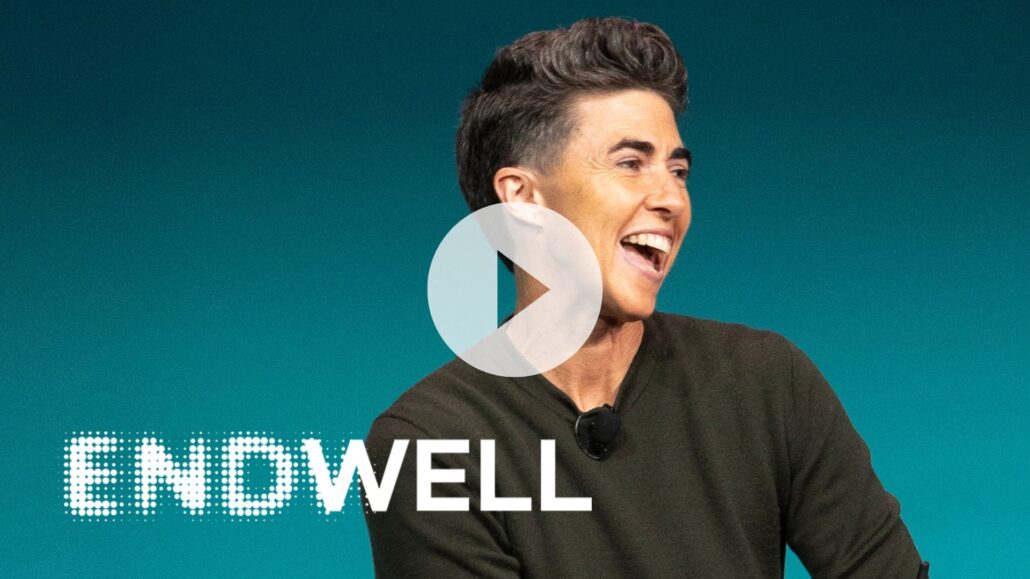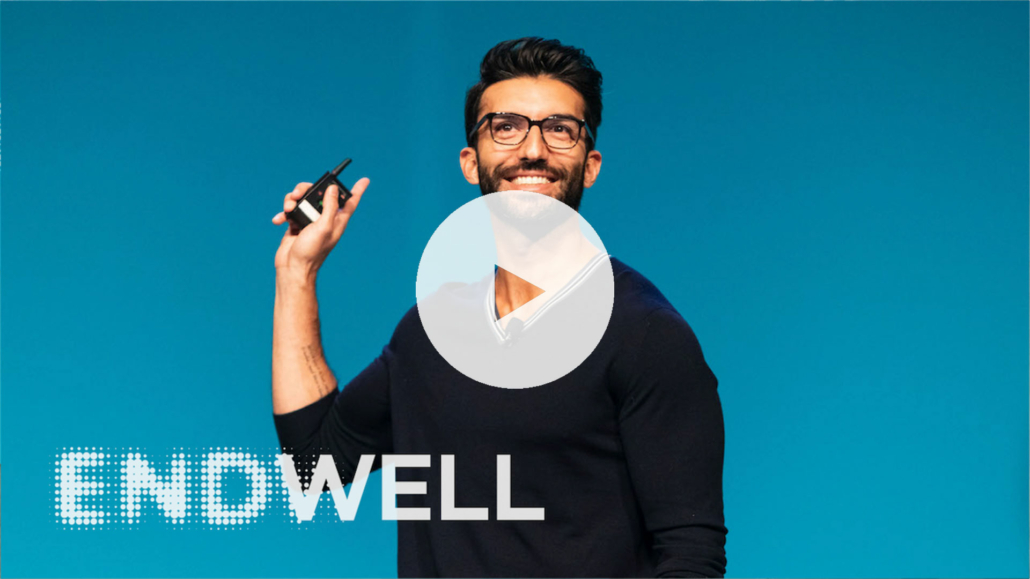Hello, my End Well family. How y’all feeling? alright, y’all.
So, I live in Georgia, so we say “y’all.” So please forgive me. But coming to this stage, I decided to be a little bit creative, and I wrote a piece that I wanted to share with you all. Will you all indulge with me for a moment in this piece?
It is in the quiet moments, when the world slows down, that I find myself most connected to the stories I’ve carried with me over the last two decades. Stories of sacrifice, of courage, of strength. Stories like my friend Kim’s, an Army veteran. Last year, on the morning of November 16th, as I got ready to be in this very space for End Well 2023, I received a call from Kim’s sister informing me that she had died the night before.
You see, I remember the first time laying eyes on Kim. We were at the Military Women’s Memorial in Arlington, Virginia. She was fierce, the life of the party, and as she would say, “full of badassedness.” She was a breast cancer survivor, but in less than two months, she would be given a new diagnosis: glioblastoma. We spent the next few months together, journeying through her life, figuring out what she wanted her legacy to be. I don’t know why Kim chose me for the job, but I do know it was an honor of a lifetime to companion her through the end of her life. And what a life she lived.
This moment is for you, Kim.
In 2006, I took off my uniform for the last time. I returned to a world that celebrated my male counterparts, calling them heroes, but me? I felt like a shadow. Some would even coin the term “invisible” to describe women veterans like me. It was as if my service had been erased. The sacrifices I had made, the stories I had heard, the pain I had carried, no longer mattered. There’s a certain kind of loneliness in that, a loneliness that made me question my place in society. But in that feeling of being unseen, I found purpose: my second service, dedicating my life’s work to supporting military and veteran families and the communities that cared for them.
You know, for a while, I kept my service hidden, staying connected to those I served with because with them, I felt safe. With them, I felt understood. Many years later, I found myself sitting in an audience full of lifesavers, people dedicated to ending suicide among our military and veteran communities. My friend Tim served as keynote that day. And as Tim took to that podium, he stood there for a moment quietly, as he gazed out into the audience and asked a question I would never forget: “Can I trust you?”
You see, many of us come home feeling alone, isolated, lacking connection and a sense of belonging, simply because we don’t know who we can trust to hold space for our experiences. That question, “Can I trust you?” echoed in my mind as I pursued my doctoral degree. It resurfaced while interviewing post-9/11 women veterans about their military transition experiences. It wasn’t long before Doc Kate, a Marine veteran, came alongside of me as my mentor, as my friend. You see, Kate was living while she was dying from stage four metastatic breast cancer. Our conversations gradually shifted from my dissertation to the realities of dying. Kate shared how military experiences resurfaced at the end of life. Kate shared that there were moments when she felt so alone. Kate shared that more needed to be done to support veterans through the end of life. And I heard her loud and clear.
So I began searching for meaningful ways to make a difference, and then I was introduced to the role of an end-of-life doula. When I was introduced to that role, my head, my heart, and my soul all at once said, “Yes.” When I close my eyes, I can vividly hear Kate saying to me, “Qwynn, not all who wander are lost. Every step of your journey has led to this moment. Now, promise me you will move the needle forward, and promise me you will tell our stories while wearing that red lipstick, of course.”
Now, here’s where it gets tricky. The moment when I had to muster the courage to tell my husband, a retired combat veteran currently serving in law enforcement, that I wanted to change the world. Can I share with y’all how the conversation went? Strike number one, it went a little something like this: “Hey, hun, we need to talk.” I sat him down and I said, “Hun, you know that job, that dream job, the one I’ve worked so hard to attain? Yeah, that one. I think I want to quit that job, care for our family, and create an end-of-life doula passion project.” His initial response? I don’t have enough time on this stage for that. But my husband, José, sat there and he looked up and he said, “Well, I guess I better buckle up.”
Shortly after Kate’s death, I phoned a friend, Dr. Tina Atherall, the CEO of PsychArmor. I called Tina to ask her, “What are we doing to care for veterans through the end of life?” You see, I didn’t want Tina to tell me what healthcare systems were doing. I knew that. I wanted Tina to tell me what communities were doing. I wanted to hear Tina tell me that communities were doing more than saying, “Thank you for your service.” I was angry and grieving, and so I ranted. And when I was done, Tina sat on that line and in the most tender of tones said to me, “What are you going to do?”
Challenge accepted. In 2023, alongside PsychArmor and the best, trusted advisors on the face of this earth, we birthed Caring for Veterans Through the End of Life, a collection of beautifully illustrated courses for compassionate communities, healthcare providers, caregivers, and loved ones.
Today, today, I’m honored to be in this space with Tina and a team of national delegates that are reimagining what a grateful nation looks like in action, supporting the evolving needs of our veterans, their caregivers, and their survivors.
Can I be honest with you all for a moment? When I decided to create this passion project, I never thought it would turn into a movement. But let me be clear, at the heart of this movement is something we all need: hope.
And when I say “hope,” I really think of hope as more than just a noun or a verb. To me, hope means hearing other people’s experiences. It’s in those stories and in those experiences that we discover the hope that will sustain our humanity. Each one of our delegates that are here at End Well 2024 understands the why and are committed to the cause. And collectively, we have accepted the challenge. We know that our community would love to do more if they knew what to do. So we’re charging ourselves with doing that.
But I’m going to give you all a little bit of a history lesson for a moment, if that’s okay. When our World War II veterans, coined the Greatest Generation, they came home to ticker-tape parades. But underneath that celebration, many carried silent burdens, stories tucked away. And then we have our Korean War veterans. They fought in what’s called “The Forgotten War,” overshadowed by the war that came before them and the war that came after them. Stories tucked away. And then there are our Vietnam veterans, who returned to a world that was deeply divided because the war was televised. They were met with anger and confusion. Stories tucked away.
To our Vietnam veterans, welcome home. And to our veterans who served in the Middle East, before and after 9/11, serving in conflicts that lasted so long, coming back to a society that questioned them about who they are, what they’ve seen, and how they could possibly return to a society that moved on without them. Stories tucked away. And to the veterans that served on missions known and unknown, all around the world, and to the veterans that served right here on American soil, our stories are tucked away. To the families, to the 14.3 million caregivers, and to their survivors, they served too. They carried the weight and stood by our sides, and their stories are tucked away.
In their honor, we must come together and honor his story, her story, their story, our story. So, I’ll ask you, “Can I trust you?” Can I trust you to see beyond the politics and the stereotypes? Can I trust you to see beyond the divide that sometimes feels unbridgeable? Can I trust you to listen to our stories, really listen to our stories, to the stories we are proud of, to the stories that may have caused us pain, to the stories that we hope to leave as a mark that we were here.
You see, these stories are opportunities to connect. These stories are calls to action, opportunities to build trust. Trust isn’t easily earned, not for someone who has learned to protect themselves in ways that most of us will never imagine. But, boy, is trust necessary, especially now as the veterans that served in conflicts around the world that actually shaped the world are dying. Their stories are being lost to time, overshadowed by the noise of the present. I’ve learned that trust is a gift, and holding space is a gift we can give in exchange.
So, I’ll ask you, will you sit in the quiet spaces between words, where regrets, unfinished business, guilt, and shame may be shared? Will you be there when forgiveness is needed? Will you stand for us as we have stood for you, and care for our families when we no longer can?
If there is nothing that you take away from me today, I hope that you take this: the true measure of how our society cares for our veterans is not when they are in the spotlight. It is when they are no longer in the spotlight, and the uniform is just a memory.
So, I will ask you all one last time, “Can I trust you?” Thank you. [Applause] [Music]

